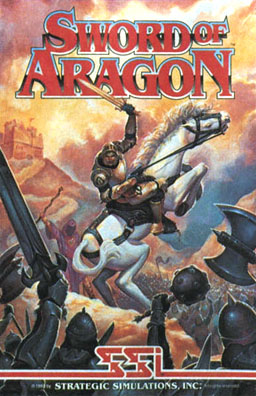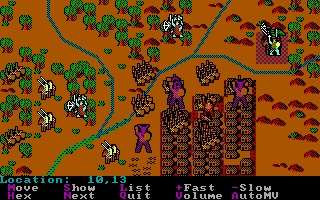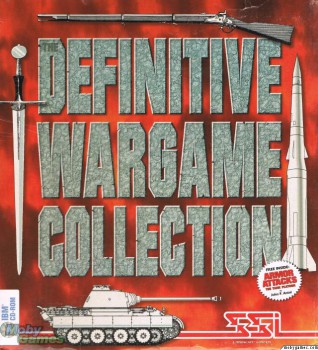Vintage Bits: Sword of Aragon
 I’m a huge fan of computer games, and especially role playing games. Perhaps the thing I enjoy most about them is they’re so clearly descended from the hobby I loved as a teen — desktop role playing and Dungeons and Dragons, itself a direct descendent of Sword & Sorcery as written by Robert E. Howard, Jack Vance, Roger Zelazny, and Fritz Leiber.
I’m a huge fan of computer games, and especially role playing games. Perhaps the thing I enjoy most about them is they’re so clearly descended from the hobby I loved as a teen — desktop role playing and Dungeons and Dragons, itself a direct descendent of Sword & Sorcery as written by Robert E. Howard, Jack Vance, Roger Zelazny, and Fritz Leiber.
The things I cherished as a young man have grown up and conquered Western Civilization. The only thing that could be better would be if the Spider-Man and Avengers comics I zealously collected forty years ago suddenly spawned billion-dollar media properties — but come on, what are the chances of that?
But back to computer games. This isn’t going to be a computer-games-aren’t-as-great-as-they-used-to-be diatribe. The fact is, modern computer games are fabulous. I can sit on my couch for hours and be thoroughly entertained watching my son play games like Arkham City, Heavy Rain, Borderlands and Enslaved. These are truly immersive experiences, with captivating plots, great characters, and outstanding pacing.
Still, you’ll notice that I didn’t say I played these games. No, my enjoyment these days is pretty much limited to watching Drew play.
I don’t game much any more. That’s not because the games suck; it’s because I grew up with a very different kind of gaming experience, and the games I want to play just aren’t made any more.
I’m not asking for the industry to roll back 20 years. What I really want to do is play all those great old games once more — something that is sadly impossible, unless I can find a way to get my old IBM 286 machine to boot up again.
What games are those? Old school dungeon-crawls, like Wizardry, Pool of Radiance, Dungeon Master, and Dragon Wars. Science Fiction RPGs like Starflight and BattleTech: The Crescent Hawk’s Inception. Adventure games like The Lurking Horror and The Secret of Monkey Island. And tactical wargames like MechCommander.
And especially the brilliant blend of wargaming, role playing, and adventure gaming that is the underrated classic Sword of Aragon, one of the finest fantasy games ever made.
Sword of Aragon is a turn-based strategy and role-playing game. Yes, you read that correctly. I’ve never described any other game that way, and I’m fairly confident I never will again. But it was exactly that: a game that put you in charge of a bunch of armies that you scooched around a hex board, while simultaneously trying to level up your young princling, and deal with the kind of tricky puzzles you’d normally only be tasked with in an adventure game, like being asked to judge the guilt or innocence of a repentant criminal.

Sword of Aragon was developed and published by Strategic Simulations, Inc. in 1989, at the height of their success. SSI ruled the computer role-playing world in 1989; their early CRPGs, like Shard of Spring and Wizard’s Crown, had been well received, but they secured the holy grail of RPG licenses when they won the right to produce official Advanced Dungeons and Dragons games in the late 80s. Their first licensed AD&D product, Pool of Radiance, became one of the top-selling computer RPGs of all time, and even today is considered one of the high water marks of computer role-playing.
Flush with success (and cash), SSI began to experiment with the fantasy genre, doing things that had never been done before, and Sword of Aragon is perhaps their finest achievement. Set in the fictional land of Aragon, a fallen kingdom once part of a mighty nation, the game follows the son of the Duke of Aladda, who as the game begins is killed in an orc raid. With his dying breath the Duke tasks his son with reunifying the land — no easy job, considering it has been overrun by titans, orcs, gobins, and other monsters.
To achieve his goal, our young hero has to build up his tiny army, win friends, grow his cities, and conquer or ally with neighboring lands and races. There are numerous tough choices along the way. For example: the elves rule the deep forests at the heart of the kingdom, and would make powerful allies, but they have sworn to be enemies of mankind until you stop chopping down trees. But promising to stop chopping trees immediately dries up the lumber supply, a crucial resource for your war machine.
As your victories accumulate, and more and more small kingdoms swear fealty to you and your young prince levels up, it gets increasingly tempting to ride your unstoppable vanguard to the doorstep of the elven kingdom, and show those haughty tree-dwelling twerps the error of their ways.
I don’t recommend this approach. At all. I still have arrow holes in my cap.
 Sword of Aragon is a very hard game, and a lot of reviewers griped about it for that reason. But it’s also full of surprises. Gutsy military victories and a generous, princely spirit are both absolutely essential to winning, but along the way you can find three powerful artifacts that will make claiming the throne a lot easier. You also get to slay a dragon, demolish the titan stronghold, and depose the cruel Emperor of the Tetradan Empire, and eventually assume the Aragonian throne. It’s a long, painful road, but an enormously satisfying one.
Sword of Aragon is a very hard game, and a lot of reviewers griped about it for that reason. But it’s also full of surprises. Gutsy military victories and a generous, princely spirit are both absolutely essential to winning, but along the way you can find three powerful artifacts that will make claiming the throne a lot easier. You also get to slay a dragon, demolish the titan stronghold, and depose the cruel Emperor of the Tetradan Empire, and eventually assume the Aragonian throne. It’s a long, painful road, but an enormously satisfying one.
Years after Sword of Aragon was released, I ran into the founder of SSI, Joel Billings, at Gencon. He told me excitedly about a new game they were working on. When I pressed him for more information, he said the closest thing he could compare it to was a little-known title they’d released years ago, one of the games he was most proud of: Sword of Aragon.
It was a bittersweet moment for me. I was pleased and excited to hear that another game in the spirit of Sword of Aragon was in the works. But it was hard to hear that so few people knew and appreciated one of the great classics of role-playing tactical wargamming fantasy adventure.
To my knowledge, that game was never released. There was never a sequel, of any kind, to Sword of Aragon. SSI was purchased by Mindscape and eventually dissolved in the late-90s, and the game is in circulation today only in two CD collections: the Definitive Wargame Collection (1995) and Twenty Wargame Classics (1996).
If you can track down a copy — and find a computer that will run a DOS game — I think you will still enjoy it.
In the meantime, I’m going to go back to fiddling with things like DOSBox and the UAE Amiga emulator, in the hope that I can find something that looks and sounds the way I know it should.
Sword of Aragon was developed and published by SSI in 1989. It was released for DOS, and eventually ported to the Amiga.
Our most recent Vintage Bits articles were Black Crypt, Lordlings of Yore, and Battletech: The Crescent Hawk’s Inception.
It’s sad that in a world where you can download just about every imaginable Nintendo and Sega title ever made, there’s no way to replay the old PC games.
’cause now, I want to play this game.
It doesn’t really have the role-playing elements, but the closest modern game I can think of to this is the open source game Battle for Westnoth.
I had a blog post about Mount and Blade which included screenshots from Dungeon Master and Temple of Apshai (man, I mapped out every room of Temple and Upper Reaches on graph paper!)
http://woodson26.blogspot.com/2011/10/mount-blade-great-game.html
Some old PC games are available though gog.com – you can get Monkey Island, Ultima and Might and Magic games for minimal cost. Some are offered for free as well (Ultima IV was free last time I checked).
Yeah, GOG offers Ultima IV and the two Worlds of Ultima games for free, along with a few others like Beneath a Steel Sky. And I don’t want to be a bad influence, but if you have a burning need to play Sword of Aragon right now, I’m sure downloading DOSBox and checking out some abandonware sites will do the trick…
I follow the independent gaming scene a lot now, and while it’s generally fantastic, something that disappoints me is that so many games hearken back to 8- and 16-bit console games, but very few are rooted in the styles of these classic PC games. There’s Legend of Grimrock, the previously mentioned Battle for Wesnoth, a few others, but not much on the whole.
GOG also has Masters of Magic and three Age of Wonders games that might be worthy of your attention.
GOG will try to acquire rights for a game if there is enough demand.
You can vote for GOG to acquire the title here http://www.gog.com/wishlist/games/sword_of_aragon
> It’s sad that in a world where you can download just about every imaginable Nintendo
> and Sega title ever made, there’s no way to replay the old PC games.
Daran,
It’s true that the emulators and download sites out there tend to favor console games, but it’s not exclusively the case. As some of the commenters above note, there are sites like GOG and GameTap that allow you to play old games.
I’m not aware of any that have SWORD OF ARAGON in their library, but I’m still looking.
> the closest modern game I can think of to this is the open source game Battle for Westnoth.
Donald,
Wow — that does look pretty good! (The link you posted was busted, but I fixed it).
Have you tried Battle for Westnoth? Love to hear from someone who’s enjoyed it.
> I had a blog post about Mount and Blade which included screenshots from Dungeon Master and Temple of Apshai
Sherlock,
That’s a nice post. My sons play Mount and Blade, and while it’s very different from the hex-based gameplay of my youth, I think the graphics are old-school enough that I could get into it. 🙂
> Some old PC games are available though gog.com – you can get Monkey Island, Ultima and Might and Magic
Doug,
It might be high time for me to check out GOG. I’ve heard a lot about it (and I subscribed to GameTap for years), and the right solution might be to support a service that does most of what I want, rather than waiting for one that’s perfect.
> something that disappoints me is that so many games hearken back to 8- and 16-bit console games,
> but very few are rooted in the styles of these classic PC games. There’s Legend of Grimrock,
< the previously mentioned Battle for Wesnoth, a few others, but not much on the whole. Andy, Legend of Grimrock is another one I looked into a few months ago. Last I heard it was still unfinished... has it finally been released in completed form?
> GOG also has Masters of Magic and three Age of Wonders games that might be worthy of your attention.
Joe,
The Age of Wonder games sucked up a lot of my time years ago! Would be good to be able to finally complete one. 🙂
> You can vote for GOG to acquire the title here http://www.gog.com/wishlist/games/sword_of_aragon
Christian,
Thanks! I note you have to be a member to vote (and that there’s already 52 votes!).
One thing I don’t understand about GOG… I see that you have to purchase every game separately, rather than a flat monthly fee like GameTap. But are the games ported to modern platforms? I have the executable files for SWORD OF ARAGON, but getting them to run is the problem. 🙂
>One thing I don’t understand about GOG… I see that you have to purchase every game separately, rather than a flat monthly fee like GameTap. But are the games ported to modern platforms? I have the executable files for SWORD OF ARAGON, but getting them to run is the problem. 🙂
Yes, GOG actually goes in and tweaks things so that they run on modern systems — I think they use transparent DOSBOX wrappers or something like that (unless I’m just making up terminology).
It’s not 100% perfect, but if you go into their forums for a given title, you can probably get a sense of whether people are having trouble with it or not.
Yeah, Legend of Grimrock is definitely finished, it was quite successful and acclaimed, and they just started development on the sequel. If you liked Dungeon Master or the Eye of the Beholder games, you should absolutely look into it!
> Yes, GOG actually goes in and tweaks things so that they run on modern systems
Ooooo. That’s nice.
I notice the average price for a game is around $10. Not bad, I guess… though I could run up a tab pretty quick playing some of my favorite games.
> Legend of Grimrock is definitely finished, it was quite successful and acclaimed, and they just started development on the
> sequel. If you liked Dungeon Master or the Eye of the Beholder games, you should absolutely look into it!
Right you are! I just checked out the trailer:
http://www.grimrock.net/media/
and it indeed looks very much like an updated DUNGEON MASTER. The official release date was last year (April 11, 2012).
I think I’m going to have to check this out. Website sells it for $14.99, which isn’t bad at all.
[…] Vintage Bits: Sword of Aragon […]
[…] Our most recent Vintage Bits article was Swords of Aragon. […]
SoA has been on Myabandonware since 2009, and XTCabandonware since 2004. It works with DOSBox without any tweaks at all. In fact, I believe every old school game he mentioned is available on either Abandonia or Myabandonware, and all work with DOSBox. Often the biggest issue is finding the documentation.
Thanks for the tip, Balformalfia. There’s no issue finding the documentation, as I have several copies of the original game.
In fact, it’s no trouble to find copies on eBay — I bought an Amiga version for under $20 just two months ago.
I’ll have to revisit Myabandonware. It’s been a while since I did a tour looking for DOSBox files, before I went back to trying to get my Amiga to work. 🙂
[…] The most recent Vintage Bits titles we covered here were Lordlings of Yore and Sword of Aragon. […]
[…] most recent Vintage Bits articles were Sword of Aragon, Lordlings of Yore, and Battletech: The Crescent Hawk’s […]
[…] tough for me to look back and pick just one favorite computer game. Sword of Aragon, Dragon Wars, Wizardry, Starflight, Starcraft, Diablo… there were so many classic games that […]